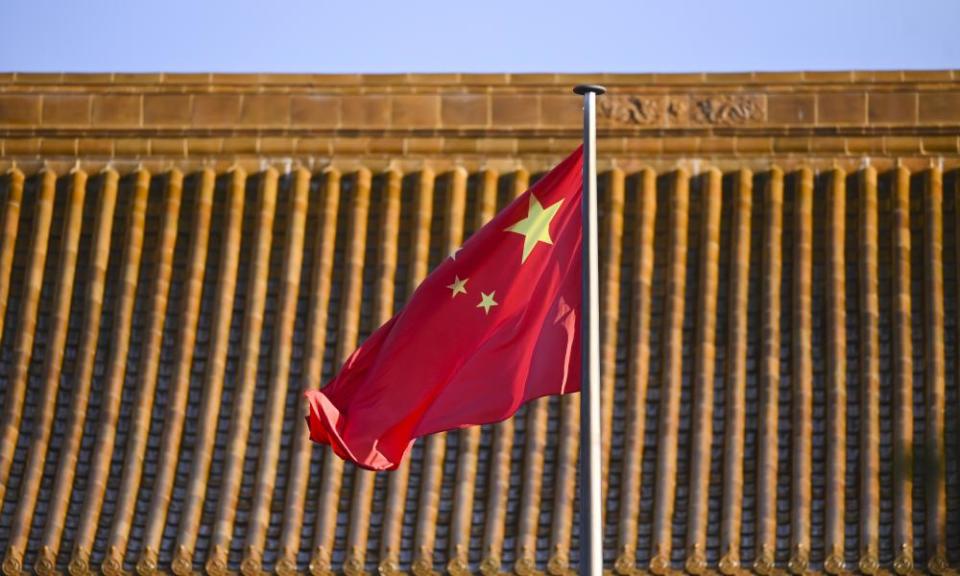China's trade bans are retaliation to Covid-19 inquiry, more than half of Australians say

More than half of Australians believe the Chinese government imposed trade sanctions in retaliation for Australia leading calls for an independent investigation into the origins of Covid-19, according to the Guardian Essential poll.
The survey, released on Tuesday, recorded strong support for the call to “stand up to the Chinese government” and demand an investigation, and a massive decline in those with a favourable view of China’s trading relationship with Australia.
The poll of 1,087 respondents, conducted from Thursday to Sunday, shows two-thirds support the Australian government position, supported by Labor, in favour of an investigation but a mixture of views about how to respond to the trade dispute.
Related: China's belt and road initiative: what is it and why is Victoria under fire for its involvement?
Respondents had a net unfavourable opinion of China’s influence on Australia’s: culture (-9%), defence, military and national security (-26%) trade (-30%), politics (-36%), and Chinese businesses operating in Australia (-40%).
Since August 2019, the net favourability of China’s influence on Australia’s trade was down 31%, while that of Chinese businesses was down 19%.
By contrast, respondents had a net favourable opinion of the US’s influence on Australia’s: politics (+2%), culture (+7%), trade (+14%), American companies (+15%), defence, military and national security (+29%). These scores also declined from August 2019, down 2 to 11%.
Asked whether it would be beneficial to strengthen Australia’s relationship with the US or China, 42% chose Australia’s ally – up 4% since August – while 18% chose its largest trading partner, down 10%. Many said neither (24%) or did not know (16%).
While a majority said the Australian government “needs to do all it can to avoid a trade war with China” (53%, to 17% opposed), many thought Australia should impose tariffs on Chinese imports in retaliation (48%, to 22% opposed) or work towards an agreement “whatever the conditions” (47%, to 23% opposed).
Australia lobbied fiercely for an independent investigation of the origins of Covid-19 before settling for joining a European Union motion for an evaluation of the global response.
While both major parties were in favour of the investigation, some Labor premiers and shadow agriculture minister have criticised the fact Australia lead the charge, incurring China’s wrath, while many in the Coalition have called for Australia to do even more to combat Chinese influence.
The Essential poll showed a continued decrease in people saying they are “very concerned” by the coronavirus, down from 33% last week to 30%, although most of those had shifted to “quite concerned” – up from 47% to 49%.
The rate of those “not at all concerned” (5%, up 1 %) and “not that concerned” (16%) are steady.
The proportion of people who say it is “very unlikely” they will contract Covid-19 is up 2% to 23%, while “somewhat likely” is up 3% to 51%.
Australians are becoming more polarised about Covid-19 restrictions, with those in favour of ending them as soon as possible up 5% to 14% and those warning it is “too soon to consider easing restrictions” up 2% to 27%.
Asked about economic supports, 36% thought free childcare and the doubling of jobseeker unemployment benefits should be extended, while 32% felt the same way about the jobkeeper wage subsidy.
Many thought the measures should end at their current expiry date, with 36% calling for jobkeeper to end in September.
Ending the supports “as soon as possible” was unpopular for free childcare (14%), jobseeker (21%), and jobkeeper (17%).
The vast majority of people continue to rate both the federal government and their state government’s response to Covid-19 “good” (73%), compared with “poor” (11%), with little sign of differentiation between the two tiers.

 Yahoo News
Yahoo News 